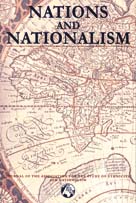Article contents
British and Irish conflict regulation from Sunningdale to Belfast Part I: Tracing the status of contesting sovereigns, 1968–1974
Published online by Cambridge University Press: 01 October 1999
Abstract
This article, which is presented in two parts, analyses the changing conceptions of the status of the two sovereigns (the United Kingdom and the Irish Republic) whose competing claims to sovereignty over Northern Ireland has been the ultimate cause of conflict. In Part I (presented here) I adapt Ian Lustick's theory of state contraction and expansion to the British-Irish relationship as it affected the negotiation of the Sunningdale Power-sharing Agreement of 1973–1974. I argue that the failure to address the competing claims to sovereignty limited the possibilities of achieving and maintaining the consent of sufficient proportions of each ethno-national community. Part II of the article (forthcoming) will extend the analysis to explain the relative equalisation of sovereignty status between Britain and Ireland and presents a modification of a ‘liberal intergovernmentalist’ explanation of the evolution of the Anglo-Irish Agreement (1985) and Belfast Agreement (1998).
- Type
- Research Article
- Information
- Copyright
- © 1999 Association for the Study of Ethnicity and Nationalism
- 6
- Cited by




